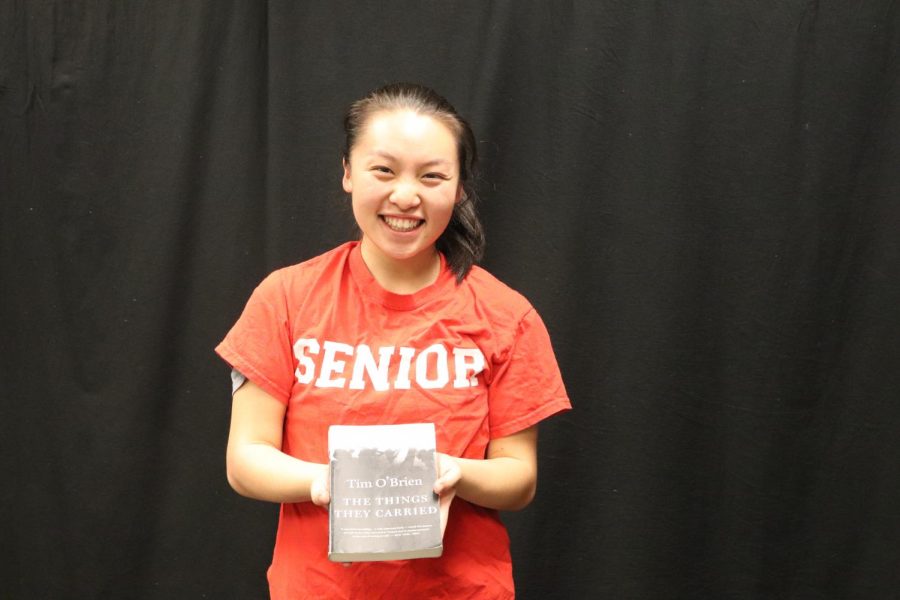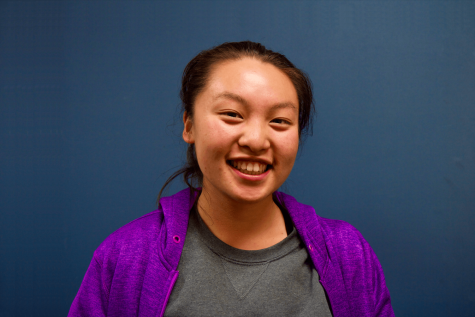Reflecting on the stories we carry
Patricia Wei is pictured holding the novel “The Things They Carried” by Tim O’Brien, where she gained the inspiration for her column’s title.
August 13, 2019
I want to start off this column by saying that in some ways, I’ve failed. This column was supposed to be published way back in May, before I graduated, but I never made much progress past the outline stage because I struggled to find the right words to convey what I wanted to say.
Funnily enough, that’s a struggle I experience for every single story I’ve written for the Epic. Honestly, it’s a miracle that I managed to get any stories done. Ask a student journalist why they joined a publication, and many will tell you: “I’ve always enjoyed writing…”
That is not me.
I joined journalism completely on a whim. Spring of freshman year, I had already turned in my forms to take computer science when my English teacher, Mr. Miller, announced to our 6th period Lit/Writ class: “I’m advising the Epic next year. You all should apply.” I thought, “Maybe it would be cool to have him again as a teacher.” And so I applied.
When I joined my sophomore year, I carried insecurities of not being able to write well, feeling like I didn’t belong.
Then, I fell in love with interviewing, with talking to someone — a student, a teacher, an administrator, a community member — and hearing their stories.
We all carry our own stories.
This summer, when I was a teaching fellow at Breakthrough Silicon Valley, a nonprofit that serves low-income/first-generation youth in San Jose, my mentor Ethan told us about the backpack theory of education. It goes a little bit like this: “Every student carries a metaphorical backpack into the classroom. Inside the backpack — which you can’t see — is everything that happens in their lives outside the classroom: what goes on at home, with friends, etc.”
I believe that it’s in these metaphorical backpacks that there are meaningful stories to be found. At Lynbrook, it can sometimes be so easy to see peers as “just another student,” adults as “just another staff member on campus.” But we are so much more. We are full of unique stories, experiences and ideas.
Sharing our stories can bring our community together. Sometimes, the courage to share a story can spark positive movements.
I never expected an interview to change my life. Then, I met Isaac: a dancer who wanted to inspire others before he graduated high school. In the spring of 2018, he shared his story with me over a total of 4+ hours.
“They say it only takes one person to start a movement,” he said. “That’s why I’m stepping out to talk. So other people can come forward and share their stories to help other people.”
Isaac reminded me that you never know what someone is going through, and that the world needs less judgement and more compassion. For that, I’m forever grateful.
Those who know me well know that I tend to run on “Pato-time” (coined by Kitchen-sensei), which basically means that I’m usually late. No doubt, the publishing time of this column is a testament to that. So here’s an overdue thank you.
To every person I’ve interviewed — students, teachers, community members, there have been too many to count — thank you for sharing a conversation with me. Whether it was for a few minutes or a few hours, thank you for sharing a piece of your metaphorical backpack with me. Wherever I go, I know I carry those stories with me.
Hearing your stories has made me realize that when we take in the story of someone else, whether it’s through an article, through a video or in person, we’re learning more about this beautiful experience of what it means to be human. We’re learning more about the world and our society, in hopes that we can make it better.




























































